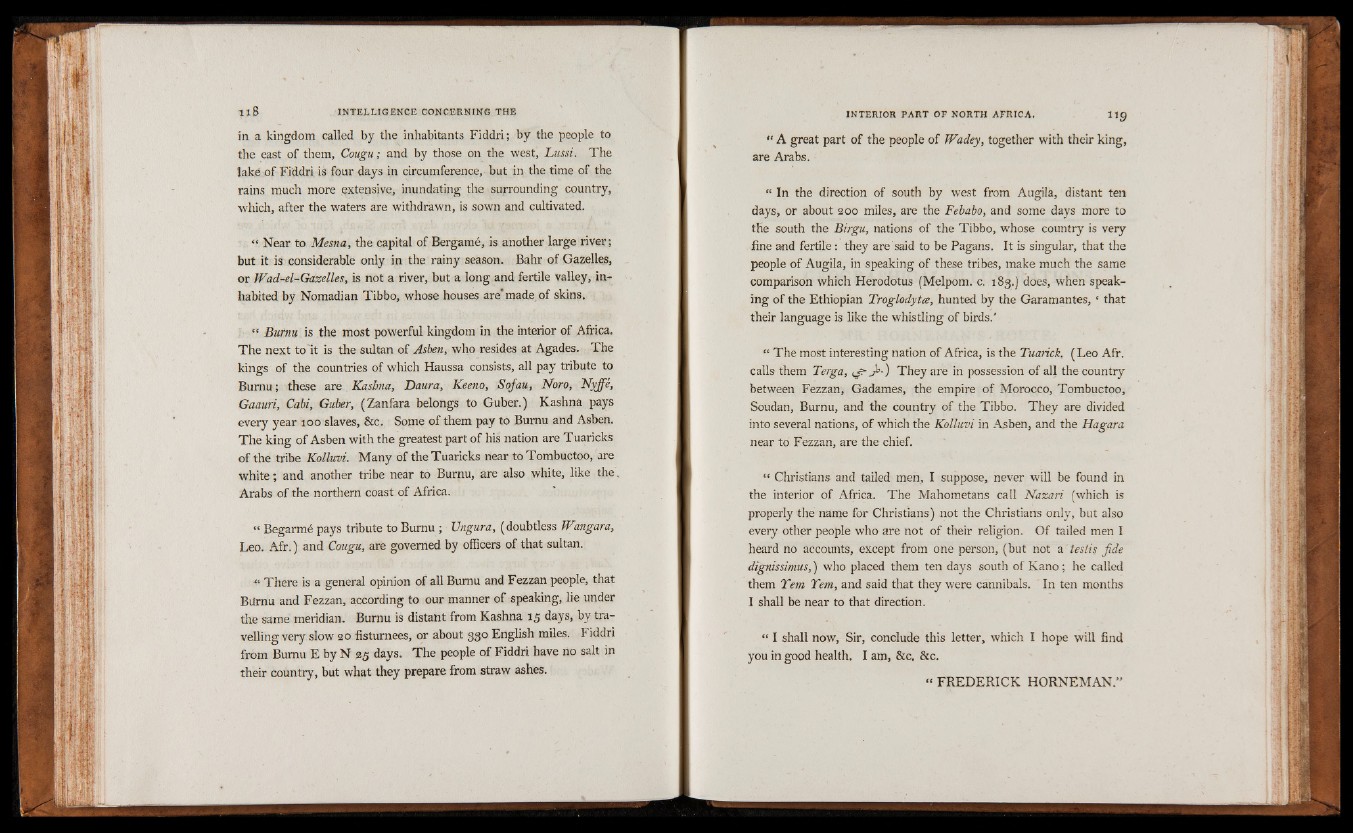
in a kingdom called by the inhabitants Fiddri; by the people to
the east of them, Cougu; and by those on the west, Lussi. The
lake of Fiddri is four days in circumference, but in the time of the
rains much more extensive, inundating the surrounding country,
which, after the waters are withdrawn, is sown and cultivated.
“ Near to Mesna, the capital of Bergame, is another large river;
but it is considerable only in the rainy season. Bahr of Gazelles,
or Wad-el-Gazelles, is not a river, but a long and fertile valley, inhabited
by Nomadian Tibbo, whose houses are*made of skins.
“ Burnu is the most powerful kingdom in the interior of Africa.
The next to'it is the sultan of Asben, who resides at Agades. The
kings of the countries of which Haussa consists, all pay tribute to
Burnu; these are Kasbna, Daura, Keeno, Sofau, Noro, Nyffe,
Gaauri, Cabi, Guber, (Zanfara belongs to Guber.) Kashna pays
every year too slaves, &c. Some of them pay to Burnu and Asben.
The king of Asben with the greatest part of his nation are Tuaricks
of the tribe Kolluvi. Many of the Tuaricks near to Tombuctoo, are
white; and another tribe near to Burnu, are also white, like the.
Arabs of the northern coast of Africa.
“ Begarm<5 pays tribute to Burnu ; Ungura, (doubtless Wingara,
Leo. Afr.) and Cougu, are governed by officers of that sultan.
There is a general opinion of all Burnu and Fezzan people, that
Burnu and Fezzan, according to our manner of speaking, lie under
the same meridian. Burnu is distant from Kashna 15 days, by travelling
very slow 20 fisturnees, or about 330 English miles. Fiddri
from Burnu E by N 25 days. The people of Fiddri have no salt in
their country, but what they prepare from straw ashes.
“ A great part of the people of Wadey, together with their king,
are Arabs.
“ In the direction of south by west from Augila, distant ten
days, or about 200 miles, are the Febabo, and some days more to
the south the Birgu, nations of the Tibbo, whose country is very
fine and fertile: they are said to be Pagans. It is singular, that the
people of Augila, in speaking of these tribes, make much the same
comparison which Herodotus (Melpom. c. 183.) does, when speaking
of the Ethiopian Troglodyte, hunted by the Garamantes, ‘ that
their language is like the whistling of birds.’
“ The most interesting nation of Africa, is the Tuarick. (Leo Afr.
calls them Terga, ¡Jr fi- ) They are in possession of all the country
between Fezzan, Gadames, the empire of Morocco, Tombuctoo,
Soudan, Burnu, and the country of the Tibbo. They are divided
into several nations, of which the Kolluvi in Asben, and the Hagara
near to Fezzan, are the chief.
“ Christians and tailed men, I suppose, never will be found in
the interior of Africa. The Mahometans call Nazari (which is
properly the name for Christians) not the Christians only, but also
every other people who are not of their religion. Of tailed men I
heard no accounts, except from one person, (but not a testis fide
dignissimus,) who placed them ten days south of Kano; he called
them Tern Tem, and said that they were cannibals. In ten months
I shall be near to that direction.
“ I shall now, Sir, conclude this letter, which I hope will find
you in good health. I am, &c. &c.
« FREDERICK HORNEMAN.”